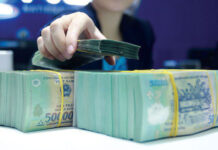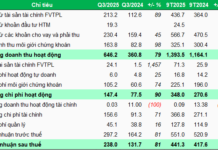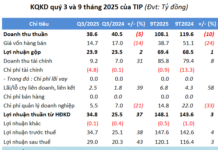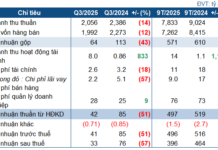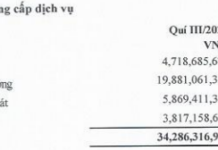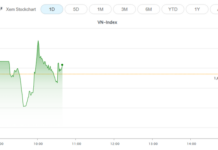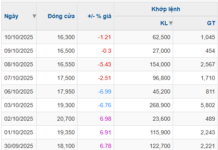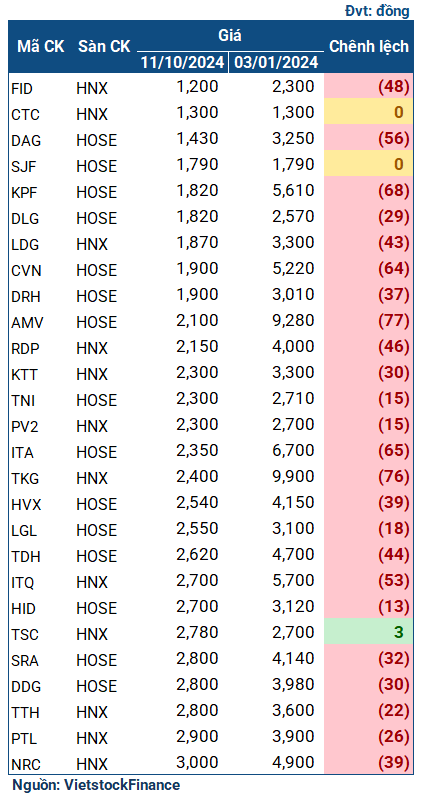
Ice tea is a humble drink, often associated with affordability. To be fair, let’s consider the price of a cup of ice tea at its cheapest – currently at 3,000 VND. At this price, there are 27 stocks listed on the HOSE and HNX exchanges with market prices equal to or lower than this amount. Among these, the cheapest stock is priced at 1,200 VND, while the most expensive is only 3,000 VND per share.
|
Stocks Cheaper than a Cup of Ice Tea
|
Topping this unfortunate list is FID (Vietnam Enterprise Investment and Development JSC). As of October 11, FID’s market price stood at just 1,200 VND per share, a 48% decrease compared to the beginning of the year. In second place is CTC (Tay Nguyen Hoang Kim Group JSC), which has maintained a market price of 1,300 VND per share since the start of the year. The last on the list (i.e., the most expensive) is NRC of Danh Khoi Group, priced at 3,000 VND per share.
In terms of decline, the top two losers are AMV (Vietnam-America Pharmaceutical and Medical Equipment Production and Trading JSC) and TKG (Tung Khanh Production and Trading JSC), which have dropped 77% and 76% in value since the beginning of the year, with market prices of 2,100 VND and 2,400 VND per share, respectively. Other notable mentions include KPF (Koji Asset Investment JSC) at 1,820 VND per share, down 68%; ITA (Tan Tao Investment and Industry Corporation) at 2,350 VND per share, down 65%; and DAG (Dong A Plastic Joint Stock Company) at 1,430 VND, down 56%.
|
Stocks Trading Below 5,000 VND per Share
|
What’s behind these rock-bottom prices?
Stock prices are influenced by numerous factors, including a company’s fundamentals, business potential, industry outlook, and market supply and demand. However, more often than not, extremely low-priced stocks are accompanied by deeper issues within the company.
For FID, the stock is currently facing a “combo” of warnings, surveillance, and trading restrictions. The company’s internals are also not looking good, with continuous losses, the heaviest being a 4 billion VND loss in 2020. In 2023, despite a 2.2-fold increase in revenue compared to the previous year, totaling more than 84 billion VND, FID still incurred a net loss of nearly 3 billion VND (compared to a profit of nearly 64 million VND in 2022).
| FID has been experiencing prolonged losses |
In the first half of 2024, FID continued to post a net loss of 2.5 billion VND, with cumulative losses of over 23 billion VND as of the end of June. The reviewed semi-annual financial statements for 2024 also received a series of qualified audit opinions, mainly related to provisions for personal advances – which FID explained as “advances for handling company matters” – and loan contracts with a number of joint-stock commercial banks.
DAG, Dong A Plastic Joint Stock Company, is currently in the process of suspended trading. Similar to FID, DAG is mired in a mess and is going through its most challenging phase in 20 years. According to the audited financial statements for 2023 (released in July 2024), DAG posted a net loss of up to 600 billion VND, mainly due to a provision for inventory devaluation of up to 404 billion VND, which caused a significant increase in cost of goods sold. This massive loss wiped out the company’s consistent profitability over the previous 16 years, resulting in a negative retained earnings figure of 588 billion VND at the end of 2023 (compared to a positive 19 billion VND at the beginning of the year). The report received three pages of comments from the auditor, highlighting bad debts – including loan and tax debts – and expressing doubts about the company’s ability to continue as a going concern.
In the first half of 2024, DAG‘s situation did not improve, with a loss of 67 billion VND and equity of just over 27 billion VND. The company generated only 55 billion VND in revenue, equivalent to 6% of the same period last year. The suspension of trading can even be considered fortunate for DAG, preventing the stock price from falling further.
| The huge loss in 2023 pushed DAG into its most challenging phase in two decades |
ITA is another company that has been making headlines. The company, owned by Dang Thi Hoang Yen (or Maya Dangelas), was recently placed under suspended trading at the end of September 2024 due to continued violations of information disclosure regulations.
In reality, ITA‘s financial performance in the recent period has not been disappointing. After a record loss of 260 billion VND in 2022, ITA posted a net profit of over 202 billion VND in 2023. In the first half of 2024, ITA continued to make a profit of nearly 64 billion VND, a 66% increase over the same period, mainly due to the reversal of provisions for doubtful debts and reduced bank interest, along with cost savings in the second quarter.
Nevertheless, ITA‘s stock price has continued to plummet due to various controversies surrounding the company. In 2022, the company was ordered by the Ho Chi Minh City People’s Court to initiate bankruptcy proceedings, relating to a debt of approximately 21 billion VND to Cong Ty TNHH Thuong Mai Dich Vu Xay Dung Quoc Linh – a claim that Ms. Yen has consistently denied. This ruling also led to several other lawsuits, which continue to impact the company’s operations, according to ITA‘s explanations in its Q2 2024 financial statements.
| ITA‘s stock price has been on a downward spiral since the beginning of the year |
Additionally, ITA has often made shocking statements. Regarding the delay in publishing its audited financial statements for 2023 and the reviewed semi-annual financial statements for 2024, Nguyen Thanh Phong – CEO of ITA – claimed that HOSE and the State Securities Commission of Vietnam (SSC) had acted unusually, creating difficulties for auditing firms and suspending the practice of auditors performing audits for ITA, leading to the departure of these firms. Ms. Yen, on the other hand, asserted that ITA was being targeted by malicious forces aiming to acquire the company. In the face of potential delisting, ITA issued a statement implying that the SSC and HOSE would be held responsible.
Another notable mention is DDG (Indochina Import Export Industrial Investment JSC), which is currently in the warning phase and has recently entered the surveillance phase due to violations of information disclosure regulations regarding its reviewed semi-annual financial statements for 2024. As of October 11, its market price was 2,800 VND per share, a 30% decrease compared to the beginning of the year. However, compared to its peak in 2023 – just before a series of 19 consecutive sessions of falling floor prices – the drop is as high as 93%.
| DDG experienced a series of 19 consecutive falling floor prices in 2023, plummeting to the ice tea price range |
The main reason behind DDG‘s predicament is the challenges it faces in its business operations. In 2023, the company posted a record loss of nearly 206 billion VND (compared to a profit of 44 billion VND in the previous year). In the first six months of 2024, the company’s revenue reached over 120 billion VND, just one-third of the same period last year. While it made a net profit of approximately 6.6 billion VND (compared to a loss of nearly 194 billion VND in the same period last year), this profit was mainly due to the disposal of fixed assets of the parent company.
| Business operation difficulties are the main reason for the decline in DDG‘s stock price |
Optimists often say that every rain eventually stops, and that stocks can’t keep falling forever. However, the storm that shareholders of these companies are facing may still have a long way to go.










